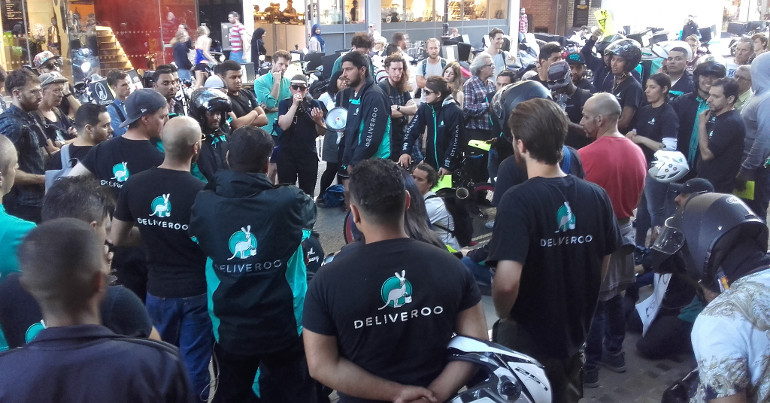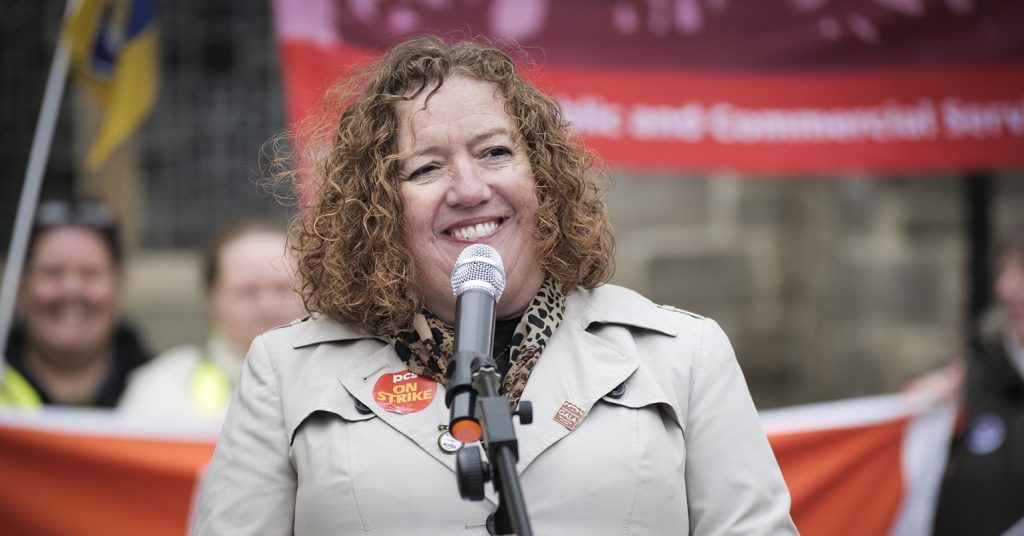Resisting exploitation and building power: the Deliveroo workers fighting back

Until the mid-20th Century, workers on dockyards faced a precarious and bleak existence with no job security. Instead of being contracted for regular hours, dock workers would gather in crowds at the dockyard gates and hope to be picked out by a supervisor, perhaps gaining just a few hours of low paid and strenuous work. Employers took no responsibility for their workforce, and with a large pool of labour to pick from, squeezed pay ruthlessly. It wasn’t until workers organised, formed unions and demonstrated their power through major strikes that they won concessions and conditions on dockyards began to improve.
The gig economy
In reality, the ‘gig economy’ represented by Uber, Deliveroo, and a growing number of others is simply the quiet reassertion of this ancient logic of capitalism – the exploitation of a large pool of insecure workers by capital in an un-unionised regulation-free environment. Instead of a supervisor at the dock gates, couriers are picked out by a mobile phone app. Decisions on distance and price are made by an opaque algorithm designed to extract the maximum value out of every worker. And while dock workers finally gained job security in 1947, Deliveroo and other companies have begun to normalise the practice of denying basic rights to a workforce through the bogus classification of ‘self-employment’.
I’m a Deliveroo rider in Bristol and have been working for them for over a year. Like the vast majority of Deliveroo couriers I’m paid per delivery, and as Bristol is a ‘free login’ zone (AKA one giant dockyard), all I need to do to start working is turn on my rider app and wait for orders. Once I’ve accepted one I cycle to the restaurant, wait for and collect the food, and ride to the customer to deliver it. Each time I do this I get paid around 4 pounds. This can add up to a good amount for a few hours during busy periods – but this is offset by the fact that at other times of the day I’d be lucky to receive one order per hour. A report into the gig economy in 2018 found that some riders earn just £2 or £3 per hour.
Added on to this is the fact that riders are self-employed, which presents itself to us as all costs and no benefits. We pay for all our equipment and maintenance, our tax and national insurance, and, if driving a vehicle, fuel and insurance costs. We get no annual leave or holiday pay, no sick leave or maternity/paternity, no pension, no cover if our bike breaks or is stolen. We have no protected rights to collective bargaining, a minimum wage or health and safety. In other words, the business costs, risks and responsibilities Deliveroo would normally bear are entirely transferred onto us. Meanwhile, through charging customers fees and restaurants commission on all orders, we believe they pocket over £10 on an average order. Of course, the rider who provides this value receives about £4.
A power imbalance
As with the dock workers, this hugely unequal relationship has inevitably led to Deliveroo beginning to squeeze riders pay. First they moved us from a flat rate per order to ‘variable’ pay per distance. Then they increased distances and lowered pay – even as they increased charges for customers – until riders were working longer trips for less money. The penny first dropped for me when these new fees were introduced – what caused me to start getting involved with organising was the realisation that if we didn’t start to do something about it, Deliveroo would drive our pay down until they found riders’ bottom limit.
Organising workers
On October 4 last year I helped organise and took part in strike action by couriers for Deliveroo and Ubereats in Bristol. Over 100 riders on bikes and mopeds occupied the streets in one of the largest strikes outside of London – on a day that involved simultaneous action from workers in fast food and ‘gig’ workplaces in more than 10 UK cities.
As we grew in confidence and numbers we formed an organisation – Bristol Couriers Network – and began a wave of increasingly organised strikes. October 4 was followed by December 11, which was followed by January 18, where the city’s Labour Mayor and Green Mayoral candidate addressed strikers and pledged to support them. This was followed by February 1, which also saw riders striking in cities such as Nottingham, Cheltenham, and Birmingham forming similar Courier groups. Now, along with couriers in Manchester, Cardiff and at least two other cities, we’re planning a strike on Valentine’s Day – traditionally a very busy day for Deliveroo.
Building power
Deliveroo has gone from ignoring our actions to sending senior managers to Bristol, issuing a threatening email to riders to scare them off strike action and saying they’re looking into minor demands. They’ve repeatedly put on temporary pay boosts in Bristol to try and break our strikes, and yet the number of workers taking part has risen each time. Couriers around the UK who have long felt powerless in the face of the gig economy’s indifference are seeing the impact of strike action and realising that the company needs its underpaid workforce far more than we need it.
The double-edged sword of the gig economy is that companies which show no loyalty to their workers should expect workers with no loyalty to that company. Workers with no relationship with management, no legal requirement to ballot for strike action, have no qualms about taking action as soon as they start to perceive it is in their interest to do so. And the penny is beginning to drop for casual workers around the UK that the only way we’ll get better pay is by organising and fighting for it.
Join the movement
This is a once in a generation fight against the growth of casualisation and precarious work across the whole economy – the Deliveroo model could be (and is being) applied everywhere, from teaching to care work.
And you can help us fight it. In Bristol we’ve come a long way since October 4. We’ve accepted that it will take prolonged and serious organisation and repeated action to bring Deliveroo – a multi-billion-dollar company – to the bargaining table. To support us in this we’ve joined up with the IWGB union, who along with the IWW are getting more involved in courier organising around the country as worker militancy rises.
We’re raising a strike fund to allow us to support workers through the protracted strikes that we know this could take. You can help us by donating here. And if you live in a major city, you can support your local couriers organise by getting in touch with them via Facebook or the local IWGB or IWW branch.




Leave a Reply